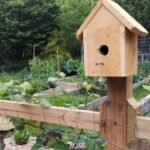Attracting beneficial insects to your garden is crucial for maintaining a balanced ecosystem and promoting plant health. Beneficial insects such as ladybugs, lacewings, ground beetles, and pollinators play essential roles in biological pest control and pollination. By creating a welcoming environment for these insects, you can reduce the need for pesticides and foster a sustainable garden. Let’s explore more tips on how to attract and support beneficial insects in your garden.

Understanding Beneficial Insects
Beneficial insects come in various forms, each contributing uniquely to garden health:
Parasitic Wasps
These tiny insects lay eggs inside pest insects, controlling their populations naturally. As the eggs hatch, the larvae consume the host insect from within, effectively reducing pest populations without the need for chemical intervention.
Hoverflies
Hoverfly larvae consume aphids, while adult hoverflies pollinate flowers, making them valuable garden allies. Adult hoverflies, on the other hand, pollinate flowers as they feed on nectar and pollen, making them valuable allies for both pest control and plant reproduction.
Praying Mantises
Known for their voracious appetite for insects, praying mantises help control pest populations. They lie in wait to ambush prey, including harmful pests like caterpillars, beetles, and grasshoppers. Their presence in the garden helps maintain a balanced ecosystem by keeping pest populations in check.
Bees
Bees are essential pollinators, facilitating the reproduction of many flowering plants, fruits, and vegetables. As primary pollinators, bees transfer pollen between flowers, enabling the fertilization and reproduction of numerous flowering plants, fruits, and vegetables. Without bees, many crops would struggle to produce fruit, impacting food production and biodiversity.
Additional Tips for Attracting Beneficial Insects
Diverse Plantings
Plant a diverse range of flowers, herbs, and vegetables to attract a variety of beneficial insects. Include native plants known to support local insect populations.
Herb Gardens
Create dedicated herb gardens with aromatic plants like basil, mint, and dill, which attract beneficial insects while doubling as culinary delights.
Companion Planting
Use companion planting strategies to naturally deter pests and attract beneficial insects. For example, marigolds repel pests while attracting pollinators.
Provide Water Sources
Set up shallow dishes filled with water and pebbles to provide drinking spots for beneficial insects like butterflies and bees.
Beneficial Insect Houses
Install insect hotels or houses made from natural materials such as hollow bamboo, logs, or bricks to provide nesting sites for solitary bees and other insects.
Avoid Chemical Sprays
Minimize or eliminate the use of chemical pesticides and herbicides in your garden. These chemicals can harm beneficial insects and disrupt the ecosystem.
Monitoring and Conservation
Integrated Pest Management (IPM)
Implement IPM strategies to monitor pest populations and intervene only when necessary to protect beneficial insects.
Natural Predators
Encourage natural predators such as birds, bats, and spiders that feed on garden pests, indirectly supporting beneficial insects.
Reduce Light Pollution
Minimize artificial lighting in your garden at night to avoid disrupting nocturnal insects’ behavior and migration patterns.
Seasonal Planting
Plan your garden to provide continuous blooming plants throughout the growing season, ensuring a steady food source for beneficial insects.
Conclusion
In conclusion, attracting beneficial insects to your garden is essential for maintaining plant health and reducing reliance on chemical pesticides. By implementing these additional tips, including diverse plantings, herb gardens, companion planting, providing water sources, and supporting natural predators, you can create a thriving ecosystem that supports beneficial insects. Embrace sustainable gardening practices to foster biodiversity and ensure your garden remains healthy and productive for years to come.











